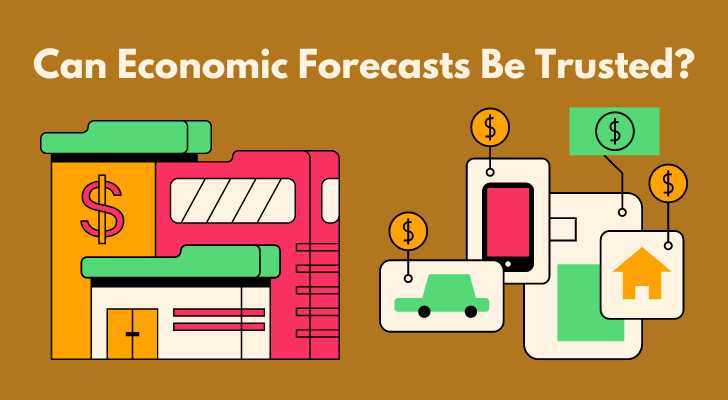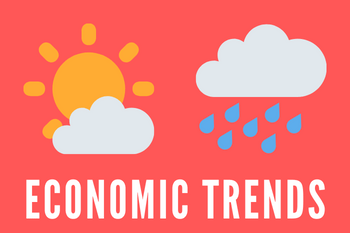Economic forecasts are an important tool for investors, businesses and governments. They provide insight into how the economy is likely to evolve and can be used to inform decisions. But with so many different sources of information, it can be difficult to know which forecast to trust. So let’s take a look at economic forecasts and why they can be unreliable. The factors that affect them, as well as how you can use economic forecasting to make better decisions in your own life, etc. Read on to learn more about economic forecasting and how you can make sure you're getting reliable data every time.

What Are Economic Forecasts?
Economic forecasts are there to predict what will happen in the economy in the future. Forecasts can be based on data from the past, current conditions, or both.
Just like any other forecast, economic forecasts can be made for different time periods, such as next week, next month, or next year. The further into the future a forecast is made, the less accurate it is likely to be.
Economic forecasting is not an exact science, and there are always risks involved. That being said, forecasts can be useful for decision-making purposes. They can help businesses plan for the future and make better decisions about investment and hiring.
How Are They Made?
Economic forecasts are created by analyzing past economic data and current economic trends. This data is then used to create models that predict what will happen in the future.
Most forecasters use a combination of techniques to make their predictions. Some of the more common methods include:
Surveys of consumers, businesses and experts
The data collected from these surveys help economists make predictions about future economic activity. Surveys are a key tool for economists because they provide insight into consumer confidence and spending habits.
Consumer confidence is a key driver of economic growth, so understanding how confident consumers feel about the future is essential for making accurate economic forecasts.
The process also involves collecting data from a variety of sources, including government agencies, private companies, and trade associations. This data is then analyzed to identify trends and patterns. Finally, economists use their expertise to interpret the data and make predictions about the future.
Analysis of government data
The analysis of government data is a critical part of forming economic forecasts. By understanding the past and current trends in government data, analysts can make more informed predictions about future economic conditions. This data can help identify potential risks and opportunities for businesses and investors.
Government data includes a wide range of information, from GDP figures to employment statistics. This data can be used to track the health of an economy and to identify areas of opportunity or concern. For example, rising unemployment may be a sign that an economy is slowing down while increasing inflation could indicate that prices are rising too quickly.
Analysts must carefully interpret government data to form accurate economic forecasts. This data can be complex, and a small change in one figure can have a big impact on the overall picture. However, by understanding the trends in government data, analysts can gain valuable insights into the health of an economy and make more informed predictions about its future direction.
Mathematical models
Mathematical models are used to forecast the future economy. They take into account a variety of factors, including interest rates, inflation, employment levels, and consumer spending. By analyzing these factors, economists can develop predictions about where the economy is headed. These models can be incredibly accurate, but they are also subject to error.
In recent years, some economists have been criticized for failing to anticipate major economic events. Nevertheless, mathematical models continue to be an important tool for understanding the economy and making policy decisions.
Forecasts can also be created using more sophisticated methods, such as econometric modeling. This type of modeling uses mathematical techniques to better understand how the economy works and make predictions about future activity.
What Factors Can Affect Their Accuracy?
The accuracy of economic forecasts can be affected by a number of factors, including the data used, the model used, and the assumptions made.
- Data: The data used in forecasting can be out-of-date or inaccurate, which can lead to inaccuracies in the forecast.
- Model: The model used to make the forecast can be oversimplified or miss important relationships, which can lead to an inaccurate forecast.
- Assumptions: The assumptions made about the future can be incorrect, which can lead to an inaccurate forecast.
Are They Ever Accurate?
It's no secret that economic forecasts are often inaccurate. In fact, a study by the Federal Reserve Bank of Philadelphia found that professional forecasters' predictions are only slightly more accurate than those made by laypeople with no forecasting experience.
So why do we still place so much trust in economic forecasts? Part of it may be because we want to believe that someone has the ability to predict the future and tell us what's going to happen. But ultimately, we rely on forecasts because they give us a starting point for making decisions.
Even if forecasts are never 100% accurate, they can still be helpful as long as we understand their limitations. For example, a forecast may not take into account all of the factors that could affect the economy, or it may be based on historical data that may not be representative of the future.
Ultimately, it's important to remember that economic forecasts are just one tool that can be used to make decisions. They should never be relied on blindly but used as part of a broader decision-making process.
Can Economic Forecasts Be Trusted?
Economic forecasts can sometimes be trusted but it is important to look at them critically. The data used in making the forecast should be examined and any potential flaws in the forecasting model should also be taken into consideration.
It’s also worth noting that economic forecasts are only as reliable as their underlying assumptions and even then they may not always provide an accurate picture of future trends.
For these reasons, economic forecasters must exercise caution when drawing conclusions from their work and use multiple sources of information when forming predictions about the economy.
Invest in Gold To Protect Yourself
Gold has been used as a form of currency and a store of value for centuries. Gold is unique in that it is not only valuable but also rare and durable. Gold is scarce, which makes it difficult to find and mine. This scarcity increases its value, as does its durability; gold will not corrode or tarnish over time.
While the price of gold can fluctuate in the short term, it has historically been a good long-term investment. Over the past 100 years, the price of gold has risen steadily. Gold price is rising in this post-Covid/War recession time. It has always been doing well during periods of economic instability, such as the Great Depression or the 2008 financial crisis, gold prices have held up relatively well. This is because investors see gold as a safe haven asset; when stock markets are crashing, they often turn to gold as a way to protect their wealth.
For these reasons, many people believe that buying gold is a good idea to protect against an economic collapse. While there is no guaranteed way to prevent losses during an economic downturn, investing in gold can help to mitigate them.


